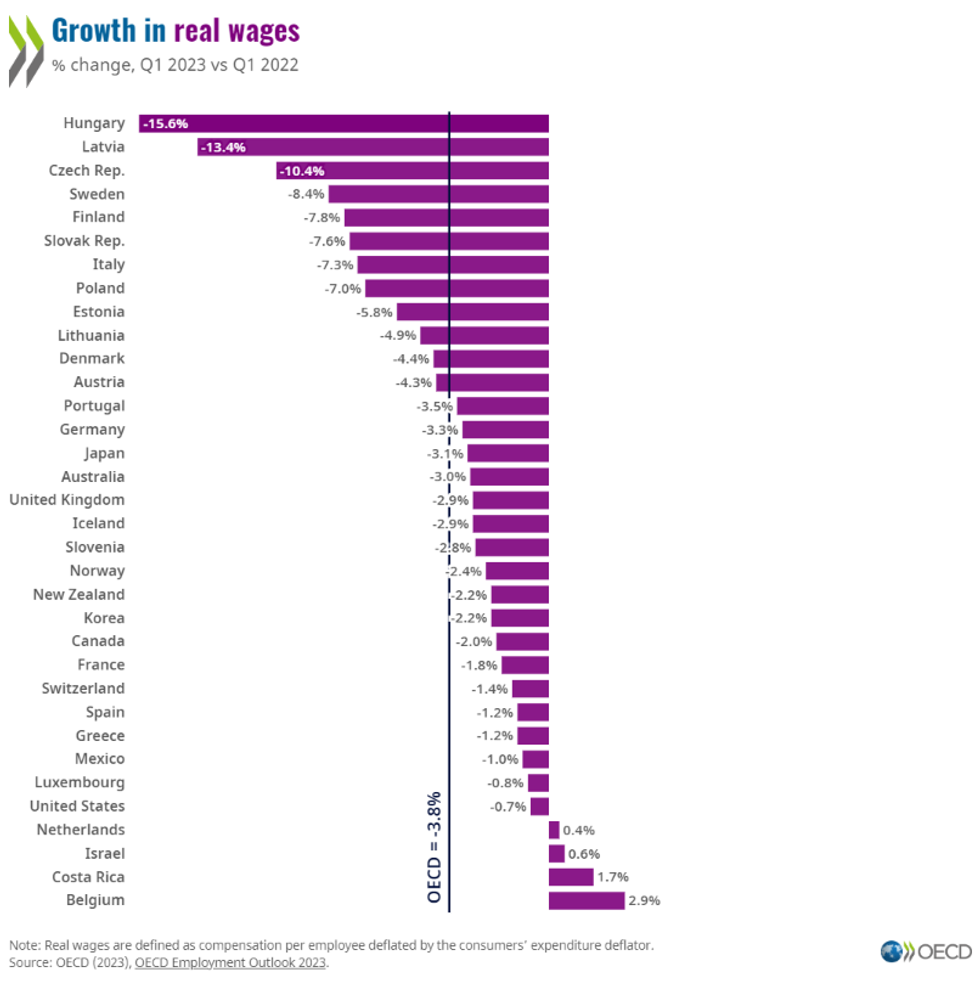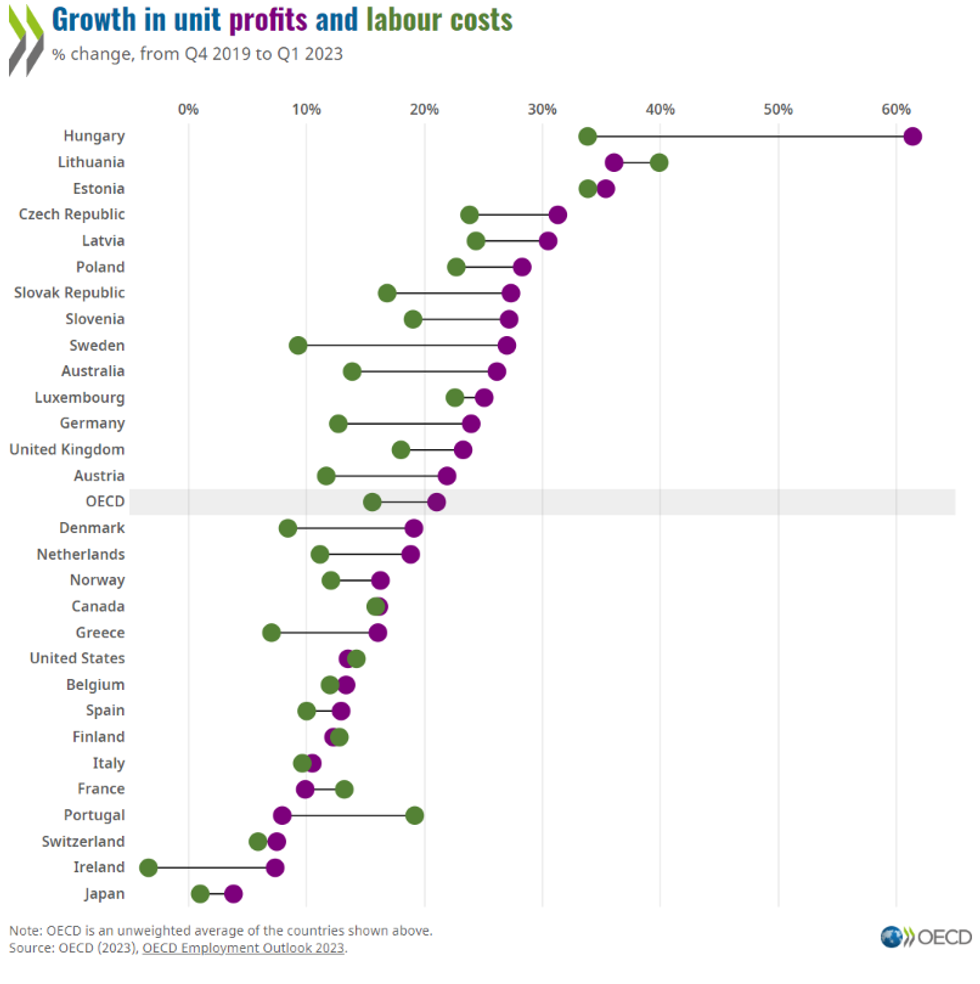As corporate profits soar, the real income of workers in 38 wealthy countries has fallen by an average of nearly 4% over the past year, and the situation could deteriorate further as artificial intelligence and other forms of technology threaten to automate 27% of existing jobs in the same nations.
That's according to the Organization for Economic Cooperation and Development's (OECD) latest annual employment outlook, published Tuesday, which stresses the "urgent need to act."
"OECD countries may be on the brink of an AI revolution."
One of the report's key findings is that in most high-income countries, labor markets have "stabilized" since the Covid-19 pandemic unleashed economic chaos more than three years ago. The OECD unemployment rate was 4.8% in May 2023, compared with 5.3% in December 2019. However, joblessness varies widely among the club's members, from 12.7% in Spain to 3.6% in the United States and 2.4% in the Czech Republic.
Tight labor markets typically improve workers' bargaining power, yielding wage gains. But despite historically low unemployment rates in many OECD countries, the report finds that real wages across the bloc declined 3.8% between the first quarter of 2022 and the first quarter of 2023.

Nominal wages increased 5.6% from Q1 2022 to Q1 2023, but that wasn't enough to offset the ongoing cost-of-living crisis, the report indicates. As a result of high and persistent inflation—a phenomenon that many experts say is inseparable from corporate profiteering—real income decreased by as much as 15.6% in Hungary, 10.4% in the Czech Republic, and 0.7% in the United States.
Several earlier analyses have shown that since the Covid-19 pandemic and Russia's invasion of Ukraine disrupted international supply chains—rendered fragile by decades of neoliberal globalization—highly consolidated corporations have capitalized on myriad crises to justify price hikes that far outpace the rising costs of doing business, padding their bottom lines at the expense of working-class consumers.
The OECD's new report also acknowledges that "profits have often risen more than labor compensation."
"Going forward," the report notes, "evidence suggests there is some room for profits to absorb further wage adjustments to recover some of the losses in purchasing power gradually without generating significant price pressures or resulting in a fall in labor demand."

Workers' incomes could take additional hits due to technology-induced automation.
"While firms' adoption of AI is still relatively low, rapid progress including with generative AI (e.g. ChatGPT), falling costs, and the increasing availability of workers with AI skills suggest that OECD countries may be on the brink of an AI revolution," the report states. "It is vital to gather new and better data on AI uptake and use in the workplace, including which jobs will change, be created or disappear, and how skills needs are shifting."
"The potential for substitution remains significant, raising fears of decreasing wages and job losses."
The report estimates that 27% of existing jobs in OECD countries are at high risk of automation, from AI and other technologies. If even a fraction of those jobs are automated, it could lead to a surge in unemployment—weakening workers' bargaining power in relation to employers and setting the stage for further wage repression.
"High-skill occupations, despite being more exposed to recent progress in AI, are still at least risk of automation," says the OECD. "Low- and middle-skilled jobs are most at risk, including in construction, farming, fishing, and forestry, and to a lesser extent production and transportation."
According to the report, 63% of finance workers and 57% of manufacturing workers are worried about job loss due to AI in the next 10 years.
The OECD makes three key recommendations to policymakers:
- Support low-wage workers: Wage policies such as minimum wages and collective bargaining can help mitigate losses in purchasing power. Governments can also provide direct support through the tax and benefit system to protect low-income households' net income.
- Implement safeguards: To reap the benefits AI can bring to the workplace while addressing risks to workers' fundamental rights and well-being, countries should consider concrete policy actions to ensure the enforcement of key principles for trustworthy use of AI. Governments need to ensure that AI serves to support inclusive labor markets, rather than hinder them.
- Ensure training for AI: Increasingly rapid AI development and adoption means that new skills will be needed, while others will change or become obsolete. Training is needed for both low-skilled and older workers, but also for higher-skilled workers. Governments should encourage employers to provide more training, integrate AI skills into education, and support diversity in the AI workforce.
Stefano Scarpetta, OECD director for Employment, Labor, and Social Affairs, wrote Tuesday that "despite the renewed worries about a jobless future, the impact of AI on job levels has been limited so far."
"However," he added, "it is also clear that the potential for substitution remains significant, raising fears of decreasing wages and job losses."






